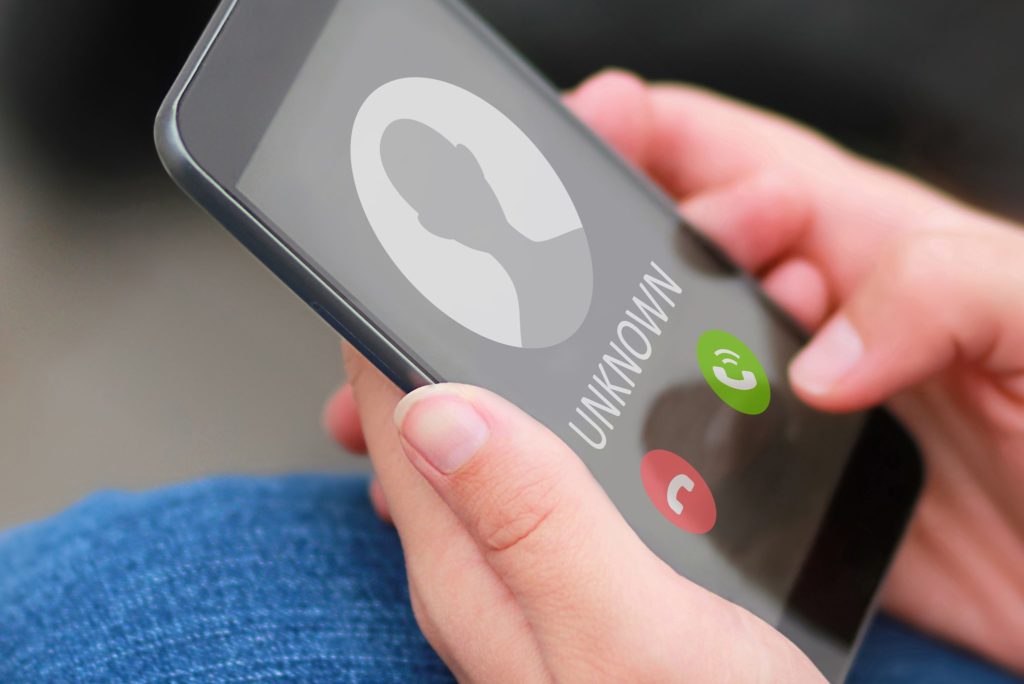Robocalls Go From Annoying to Dangerous
Hospital phone lines are being overwhelmed.

We all know that constant calls to our phones from spammers and scammers can be frustrating. But a Washington Post report notes that they causing serious disruption at hospitals and other medical facilities, with potentially deadly consequences.
In the heart of Boston, Tufts Medical Center treats scores of health conditions, administering measles vaccines for children and pioneering next-generation tools that can eradicate the rarest of cancers.
But doctors, administrators and other hospital staff struggled to contain a much different kind of epidemic one April morning last year: a wave of thousands of robocalls that spread like a virus from one phone line to the next, disrupting communications for hours.
For most Americans, such robocalls represent an unavoidable digital-age nuisance, resulting in seemingly constant interruptions targeting their phones. For hospitals, though, the spam calls amount to a literal life-or-death challenge, one that increasingly is threatening doctors and patients in a setting where every second can count.
At Tufts Medical Center, administrators registered more than 4,500 calls between about 9:30 and 11:30 a.m. on April 30, 2018, said Taylor Lehmann, the center’s chief information security officer. Many of the messages seemed to be the same: Speaking in Mandarin, an unknown voice threatened deportation unless the person who picked up the phone provided their personal information.Such calls are common, widely documented scams that seek to swindle vulnerable foreigners, who may surrender their private data out of fear their families and homes are at risk. But it proved especially troubling at Tufts, which is situated amid Boston’s Chinatown neighborhood, Lehmann said. Officials there couldn’t block the calls through their telecom carrier, Windstream, which provides phone and Web services to consumers and businesses. “There’s nothing we could do,” Lehmann said Windstream told them.
Administrators at other hospitals, cancer centers and medical research organizations around the country share Tufts’s robocall concerns. They fret that such a seemingly obvious tech malady has worsened in recent months and that government regulators and phone companies have been too slow to help. And they fear that robocallers could eventually outmatch their best efforts to keep hospital phone lines free during emergencies, creating the conditions for a potential health crisis.
“Imagine a scenario when our phone system doesn’t keep up,” Lehmann said.This May alone, robocallers rang Americans’ smartphones an estimated 4.7 billion times, according to YouMail, a company that makes an app that helps users block suspected spam calls. That’s nearly double the amount from two years ago, reflecting the extent to which fraudsters have outwitted carriers such as AT&T and Verizon, lawmakers on Capitol Hill and the government’s chief robocall cops, including the Federal Communications Commission.
—-Tony Romm,”Robocalls are overwhelming hospitals and patients, threatening a new kind of health crisis“
While I’m not sure it ever occurred to me, it’s obvious when pointed out. Despite having tried numerous services, including YouMail, to screen out robocalls I still get ten or more daily on my mobile phone. I’ve had the ringer off on my landline phone* for years, as 99 percent of the calls there are automated scams.
For a while, the Federal Do Not Call Registry made quite an impact on the problem but eventually the companies just went offshore and out of reach of US authorities. One would think the phone companies themselves would want to screen spam—I’d switch immediately if one earned a reputation for doing so well—but they either aren’t sufficiently motivated or the problem is just not technologically solvable.
Top telecom providers say they are working to implement new technologies that would label a call that’s likely to be spam, but widespread implementation is many months away. At the same time, the FCC recently has stepped up efforts to find and fine scammers, while helping consumers access tools that can block suspected spam numbers. But the agency has stopped short of fully rewriting the nation’s anti-robocall rules, something experts say would be necessary to truly stop the scourge.
“These calls to health-care institutions and patients are extremely dangerous to the public health and patient privacy,” said Rep. Frank Pallone Jr. (N.J.), the Democratic chairman of the House Energy and Commerce Committee, who has put forward legislation to try to clamp down on robocalls. “The FCC and Justice Department need to go after these criminals with the seriousness and urgency this issue deserves.”
It’s hard to think of a political issue’s more of a no-brainer. Even Mitch McConnell wouldn’t try to stop the legislation.
Robocalls targeting hospitals and other health-care organizations hardly represent a novel threat. When Congress adopted the government’s anti-robocall rules in 1991, lawmakers specifically cited consumers’ complaints that automated spam calls were tying up critical emergency lines. More than two decades later, the FCC cited that very authority in issuing a $120 million fine against Adrian Abramovich, a Florida man who placed nearly 100 million robocalls in a telemarketing scheme that also interfered with hospital pagers.
In the telecom industry, phone carriers now say they’re investing more heavily in efforts to trace the origins of deceptive robocalling campaigns, including those that target health-care organizations. From there, they can increasingly help federal law enforcement officials in their investigations, said Patrick Halley, the senior vice president of advocacy and regulatory affairs at USTelecom, an industry lobbying group.
But many health and security experts say they are still fearful of mass disruption at a time when robocalls remain on the rise.
And yet.
Democrats and Republicans alike on Capitol Hill long have been united in seeking legislation to crack down on robocalls, but they’ve yet to pass a single law in response.
Again, it’s hard to come up with an issue area where legislation would be more popular than this one.
_________________
*I’d get rid of it entirely but it comes bundled with my Internet service and is oddly cheaper than the same plan minus phone service. There’s also utility in having emergency calling capability.






I no longer have a landline but I do get these calls on my smartphone regularly, including calls from overseas numbers. Since I generally don’t answer calls from numbers I don’t recognize I can’t be sure how many of them are robocalls but I assume most if not all of them are.
The latest scam appears to be robocalls that appear from the caller ID to be coming from numbers that share the same area code (and sometimes the same first three digits) as my phone number. These too get ignored and inevitably they don’t leave a voice mail.
@Doug Mataconis: The fact that I’m still grimly holding on to a Nebraska phone number on my cell phone (from over a decade ago) while living here in Chicago has made it very easy for me–anything coming in with a Nebraska area code I ignore.
The longer I’ve used this as a filter the more I appreciate it.
Ironically, as I was finishing up my comment above, another one of those apparent robocalls came in. This will generally continue throughout the day.
“Hold my beer. Watch this!”
I’m not sure why but I don’t get anywhere near that # of robocalls on my phones. I’m not sure if my effective screening of the #s produces a suppressing feedback loop or what, but I can go days without getting a call from a # I don’t recognize.
@Doug Mataconis: If they can’t be bothered to leave a message, why should I bother to answer their call?
@OzarkHillbilly: I dunno. Maybe my area code is attractive to scammers? Like @Doug Mataconis, I generally don’t answer calls from numbers I don’t know. The only exception is when I’m specifically awaiting a call from someone whose number I don’t have in my contacts. Still, there seems to be no way to make calls from those not in my contacts go directly to voicemail, or I’d do it.
@James Joyner: Yeah, I’m not being serious about some magical ability to avoid them. I just don’t seem to have the problem the way most other folks do.
Blocking these calls is a huge technical issue, mainly because the calling parties are spoofing the called from number (they are faking your area code and sometimes your prefix). Those called from numbers drive network routing actions. There is a fix in the offing for calls that rely on SIP (new) switching technology, but there is no currently known way to address this issue for TDM (old) switching technology used in most wireline networks. It is not for a lack of trying from the carriers.
When I had kids at home, in school, etc., I could not afford to ignore unknown calls. When I do answer these calls on my smartphone, I just put down the phone without hanging up – my goal is to occupy as much of the callers resources as I can without me taking any other action.
I only get about half a dozen calls a week and only on one of the two cell numbers that I have. (I opened a second account when I moved so people would have a local number to call if they need one.) On the other hand, I have a pretty small digital foot print and don’t use 4G service on either phone–just use them for telephones. My calls–I answer them occasionally–are “this is your last chance to buy an extended warranty for your car” (I only wish it were so) and what seems to be some sort of a time share scam. As an old retired geezer, I would have expected that I might attract more, but I’ve been lucky so far.
I don’t get many scam calls. I do get a lot of calls from banks and telemarketers, though. The annoying part is you answer and say “hello?” and no one answers back. It takes like 10-15 seconds for them to reply. In one of these calls they explained the computer makes the call, and assigns it to a live agent only when I pick up.
More than a few times, instead of a person answering, I get the recording “your call is important to us.” I hang up then. It’s one thing to have your day interrupted with a call, but to be put on hold?
Call me cynical, but I suspect if there was a law that a phone company was fined a dollar for every scam call that went through they would find a technological fix pretty fast. It’s like the way major corporations keep getting vast troves of data stolen — we let it be far cheaper for them to suffer the theft of our information than to protect it.
@grumpy realist:
I lived in Atlanta when I got my first AT&T cell phone in 2009. I moved away in 2010, and have never moved back to Georgia.
I keep my (404) number precisely for the same screening reason.